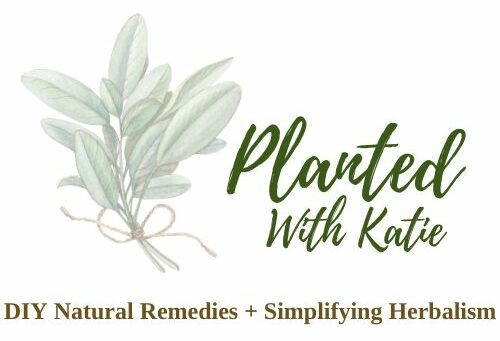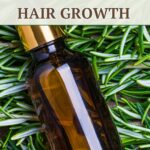DIY Peppermint and Rosemary Oil For Hair Growth
By making your own DIY peppermint and rosemary oil for hair, you can enjoy the full use of these powerful, natural ingredients. The recipe is simple, and the consistent use of this hair growth oil can lead to thicker, stronger, and healthier hair.
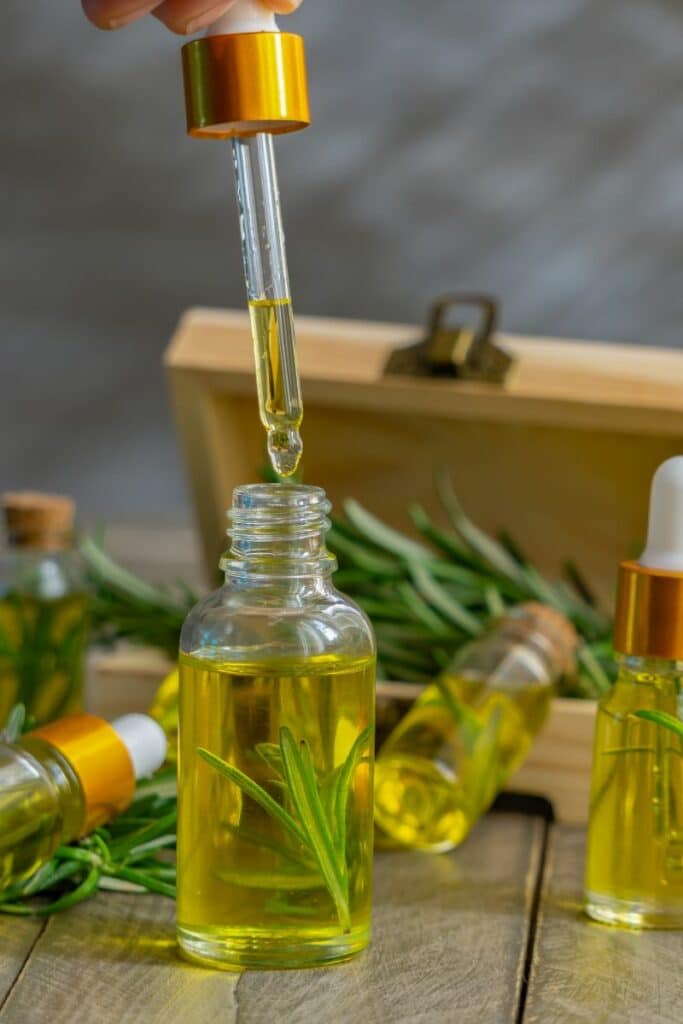
Disclaimer: This is not medical advice. Information and statements shown here are for educational and informational purposes only and are not to replace the advice of your healthcare professional.
This post may include affiliate links. Please refer to our disclaimer for full disclosure.
Taking care of your hair naturally is super important. Natural hair care helps keep your scalp and hair healthy without using harsh chemicals. Herbs are a big part of this because they can boost hair growth and improve scalp health.
Peppermint (Mentha piperita) and rosemary (Rosmarinus officinalis) are two amazing herbs that can help with hair loss. They have special properties that make your hair thicker and stronger. By using peppermint and rosemary oil, you can improve your scalp health, reduce hair breakage, and support healthy hair growth.
In this guide, we’ll show you how to make your own peppermint and rosemary hair oil. This hair growth oil uses the whole plant for maximum benefits. You’ll learn how to make a hot oil treatment that’s perfect for all hair types. Get ready to transform your hair with this powerful, natural remedy!
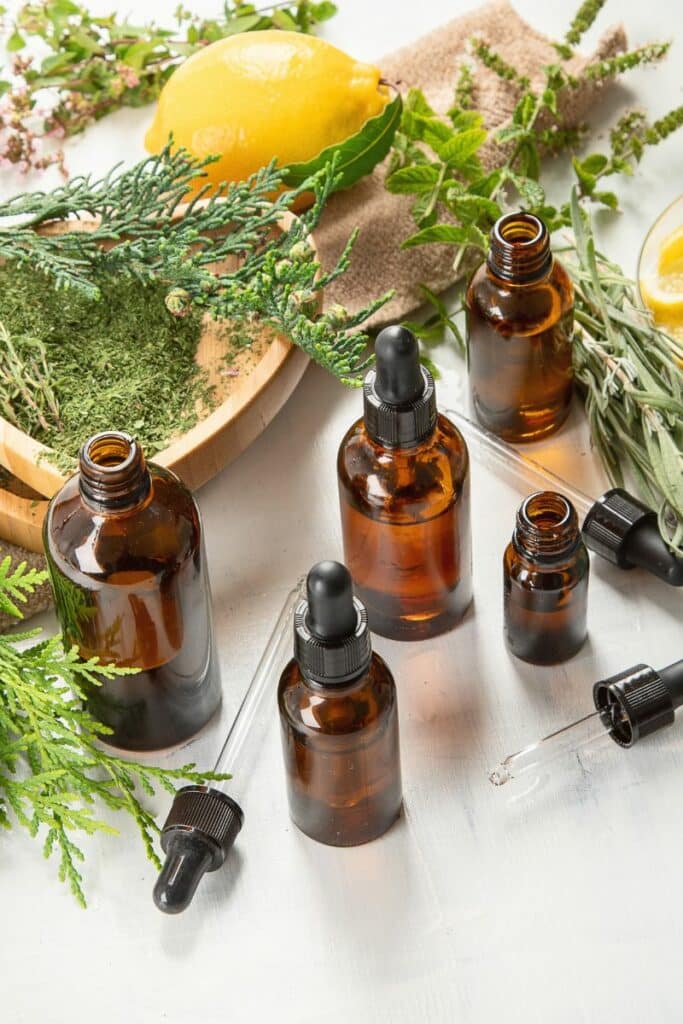
Top 5 Reasons Peppermint and Rosemary Oil Work for Hair Growth
1. Stimulates Blood Circulation
How Peppermint Oil Increases Blood Flow to the Scalp:
Peppermint oil, or Mentha piperita, helps boost blood flow to your scalp. This means more oxygen and nutrients get to your hair roots, which can help with hair loss and promote healthy hair growth.
The Role of Rosemary Oil in Improving Circulation and Nutrient Delivery:
Rosemary oil, or Rosmarinus officinalis, also helps increase blood circulation. It makes sure your hair roots get all the nutrients they need to grow strong and thick.
2. Anti-inflammatory Properties
Peppermint and Rosemary Oils' Ability to Reduce Scalp Inflammation:
Both peppermint and rosemary oils have anti-inflammatory properties. They help calm irritated skin and reduce scalp inflammation, which is great for overall scalp health.
Benefits for Those with Dandruff or Scalp Irritation:
If you have dandruff or an itchy scalp, these oils can help. They soothe the scalp and reduce flakiness, making your hair and scalp healthier.
3. Antimicrobial Effects
How These Oils Combat Scalp Infections and Keep Hair Follicles Healthy:
Peppermint and rosemary oils have antimicrobial properties. This means they can fight off bacteria and fungi that might infect your scalp.
Prevention of Bacterial and Fungal Growth:
By keeping your scalp free of infections, these oils help maintain healthy hair follicles, preventing issues like hair thinning and breakage.
4. Promotes Hair Follicle Health
The Effect of These Oils on Strengthening Hair Follicles:
Using peppermint and rosemary oils can strengthen your hair follicles. This makes your hair less likely to break and helps it grow longer and stronger.
Prevention of Hair Thinning and Breakage:
Strong hair follicles mean less hair thinning and breakage. This helps you maintain thicker, healthier hair over time.
5. Aromatherapy Benefits
The Calming Effects of Peppermint and Rosemary Oils:
Both oils are great for aromatherapy. They have a calming effect that can reduce stress.
How Stress Reduction Can Contribute to Healthier Hair Growth:
Less stress means less hair loss. By using these oils, you can help keep your mind calm and your hair growing strong.
Peppermint and rosemary oils are key ingredients in a potent blend for healthy hair growth. Consistent use can lead to stronger, thicker hair and improved scalp health.
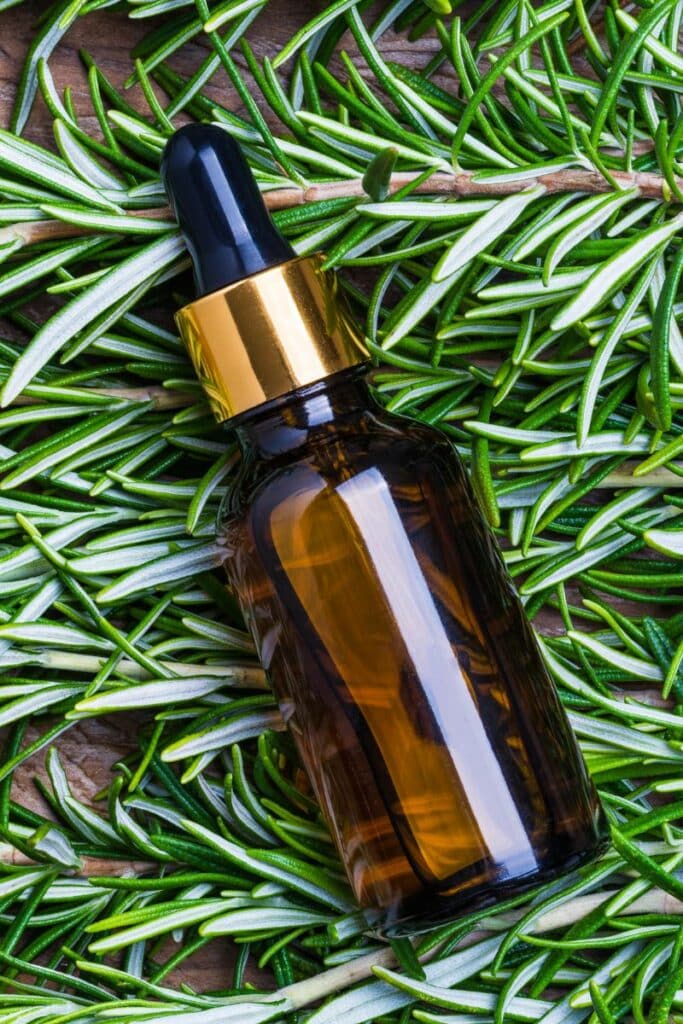
Why Herb-Infused Oils are Better Than Just Essential Oils
Whole Plant Benefits
When you make herb-infused oils, you use the whole plant. This means you get a lot more of the good stuff that helps your hair. It’s not just the strong essential oils; you also get other important compounds that help with scalp health and hair growth.
Herb-infused oils are like a complete package for your hair. While essential oils are very strong and concentrated, infused oils give you a gentle and balanced blend. This is great for all hair types and helps with hair thickness and strength.
The whole plant has many active ingredients that work together. This synergy makes herb-infused oils very effective for promoting healthy hair growth and scalp oil balance.
Gentler on the Scalp
Using pure essential oils can sometimes irritate your scalp, especially if it’s sensitive. Herb-infused oils are gentler and less likely to cause an allergic reaction or irritated skin. This makes them perfect for people with an itchy scalp or dry scalp.
Herb-infused oils are safe for daily use. They are mild and nourishing, making them ideal for keeping your scalp healthy without the risk of irritation. Whether you have oily hair, dry hair, or anything in between, infused oils can help maintain overall hair health and strength.
Using herb-infused oils with essential oils like peppermint and rosemary can transform your hair care routine. These oils offer a potent blend of benefits, making your hair thicker, stronger, and healthier with consistent use.
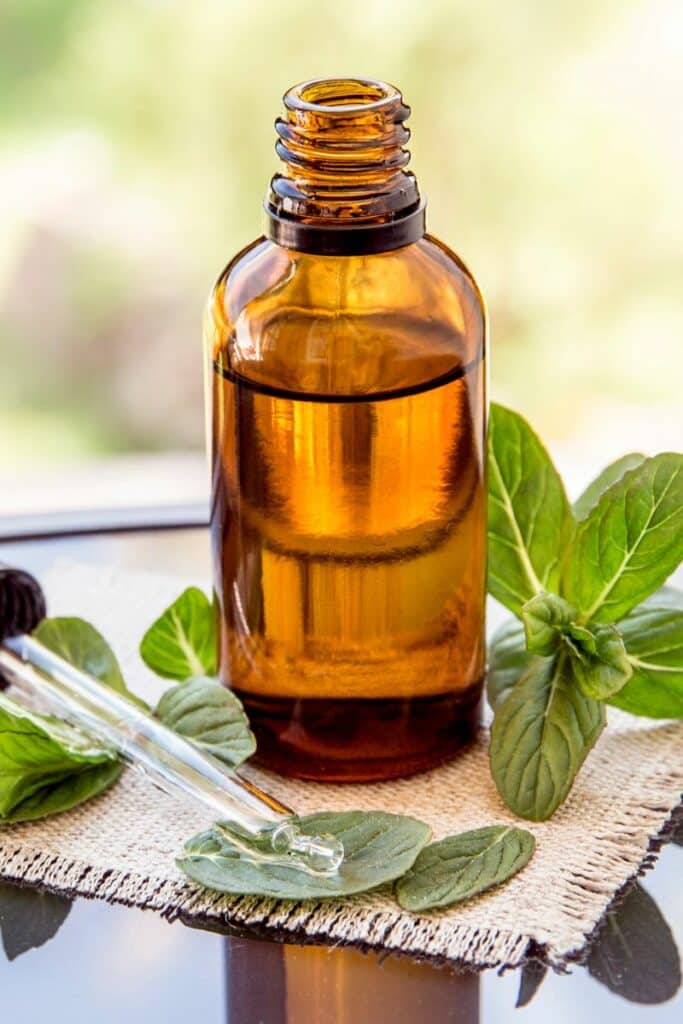
DIY Peppermint and Rosemary Oil For Hair Recipe
Ingredients Needed
- Dried peppermint leaves
- Dried rosemary leaves
- Carrier oil (e.g., olive oil, coconut oil, jojoba oil)
- Peppermint essential oil
- Rosemary essential oil
- Optional: Vitamin E oil for added benefits
Step-by-Step Instructions
1. Prepare the Herbs
- Measure equal parts of dried peppermint and rosemary leaves.
- Crush the herbs slightly to release their natural oils.
2. Infuse the Oil
- Place the crushed herbs in a clean, dry jar.
- Pour the carrier oil over the herbs, ensuring they are completely submerged.
- Seal the jar and place it in a warm, sunny spot for 2-4 weeks, shaking it gently every few days.
3. Strain the Oil
- After the infusion period, strain the oil through a fine mesh or cheesecloth into a clean container.
4. Add Essential Oils
- Add a few drops of peppermint and rosemary essential oils to the strained herb-infused oil.
- Optional: Add a few drops of Vitamin E oil.
5. Blend and Store
- Blend thoroughly and transfer the infused oil into a dark glass bottle for storage.
Application Instructions
How to Apply the Mixture to the Scalp and Hair:
- Part your hair into sections and apply a small amount of the infused oil to your scalp.
- Massage the oil into your scalp using your fingertips in a circular motion.
- Work the oil down to the ends of your hair for full use.
Recommended Frequency of Use for Optimal Results:
- Use the infused oil 2-3 times a week.
- For a hot oil treatment, warm the oil slightly before applying, cover your hair with a shower cap, and leave it on for 30 minutes before washing it out.
- Consistent use will help promote healthy hair growth, reduce hair loss, and improve overall scalp health.
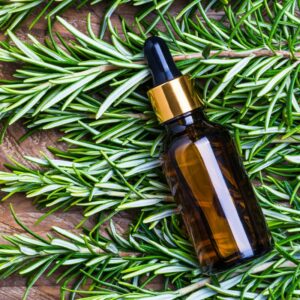
DIY Peppermint and Rosemary Infused Oil Recipe
Ingredients
- 1/2 cup dried peppermint leaves
- 1/2 cup dried rosemary leaves
- 8 ounces carrier oil e.g., olive oil, coconut oil
- 10 drops peppermint essential oil
- 10 drops rosemary essential oil
- Optional: 10 drops Vitamin E oil for added benefits
Instructions
- Measure 1/2 cup each of dried peppermint and rosemary leaves.
- Crush the herbs slightly to release their natural oils.
- Place the crushed herbs in a clean, dry jar.
- Pour 8 ounces of carrier oil over the herbs, ensuring they are completely submerged.
- Seal the jar and place it in a warm, sunny spot for 2-4 weeks, shaking it gently every few days.
- After the infusion period, strain the oil through a fine mesh or cheesecloth into a clean container.
- Add 10 drops each of peppermint and rosemary essential oils to the strained herb-infused oil.
- Optional: Add 10 drops of Vitamin E oil.
- Blend thoroughly and transfer the infused oil into a dark glass bottle for storage.
Notes
- Part your hair into sections and apply a small amount of the infused oil to your scalp.
- Massage the oil into your scalp using your fingertips in a circular motion.
- Work the oil down to the ends of your hair for full use.
- Use the infused oil 2-3 times a week.
- For a hot oil treatment, warm the oil slightly before applying, cover your hair with a shower cap, and leave it on for 30 minutes before washing it out.
- Consistent use will help promote healthy hair growth, reduce hair loss, and improve overall scalp health.
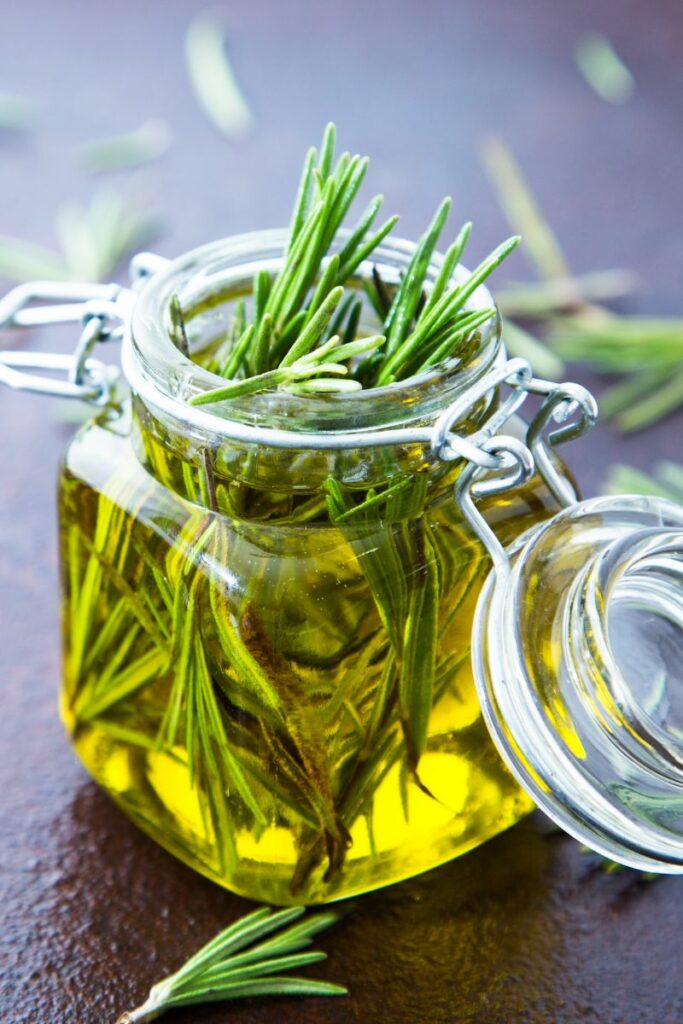
Tips for Best Results
How to Perform a Patch Test to Avoid Allergic Reactions
- Apply a small amount of the oil mixture to a small patch of skin on your inner arm.
- Cover the area with a bandage and wait 24 hours.
- If you notice any redness, itching, or irritation, do not use the oil on your scalp. If there's no reaction, it's safe to use.
Tips on Massaging the Oil into the Scalp for Enhanced Absorption
- Use Your Fingertips: Gently massage your scalp with your fingertips in circular motions.
- Start at the Hairline: Begin at your hairline and work your way towards the back of your head.
- Apply Gentle Pressure: Use gentle pressure to stimulate blood circulation without causing irritation.
- Focus on Problem Areas: Pay extra attention to areas where you experience hair thinning or dryness.
Suggested Routine for Incorporating the Oil Treatment into Your Hair Care Regimen
- Pre-Shampoo Treatment: Apply the oil before shampooing your hair. Leave it on for 30 minutes to allow the oil to penetrate your scalp and hair.
- Overnight Treatment: For deeper conditioning, leave the oil in your hair overnight and wash it out in the morning.
- Weekly Routine: Use the oil 2-3 times a week for best results.
- Hot Oil Treatment: Warm the oil slightly before applying, cover your hair with a shower cap, and leave it on for 30 minutes before washing out.
Frequently Asked Questions (FAQs)
How often should I use peppermint and rosemary oil for hair growth?
Use the oil 2-3 times a week for optimal results. Consistent use will promote healthy hair growth and improve scalp health.
Can I leave the oil in my hair overnight?
Yes, you can leave the oil in your hair overnight for deeper conditioning. Just cover your hair with a shower cap or towel to protect your bedding.
Are there any side effects of using these oils?
Some people may experience allergic reactions or irritation. Always perform a patch test before using the oil. If you notice any redness or itching, discontinue use.
Can I use these oils if I have a sensitive scalp?
Yes, herb-infused oils are gentler than pure essential oils. However, always perform a patch test first to ensure you don’t have an adverse reaction.
What other natural ingredients can complement this oil blend for hair growth?
Castor Oil (Ricinus communis): Known for its ability to thicken hair and promote growth.
Avocado Oil: Rich in essential fatty acids, it nourishes the scalp and hair.
Lavender Oil (Lavandula angustifolia): Helps calm the scalp and can promote hair growth.
Tea Tree Oil: Has antimicrobial properties that can help keep the scalp healthy.
Black Seed Oil: Known for its anti-fungal properties and overall hair health benefits.
Grapeseed Oil (Vitis vinifera): Lightweight and helps with oily hair while promoting scalp circulation.
Sweet Almond Oil (Prunus amygdalus dulcis): Great for dry scalp and adds shine to the hair.
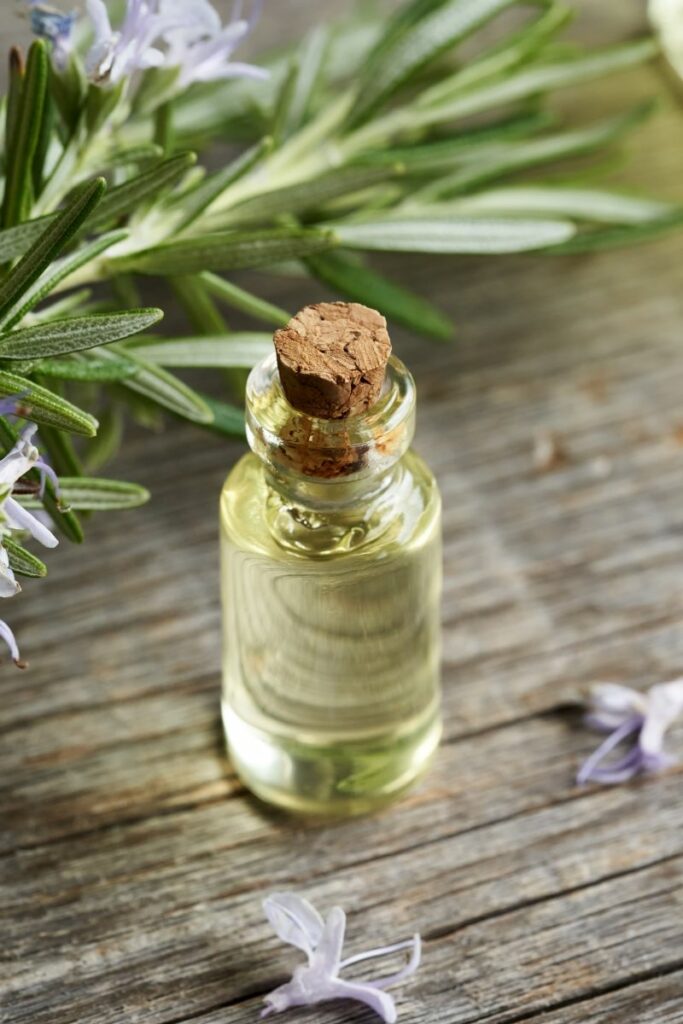
Conclusion
Using peppermint and rosemary oil for hair growth offers many benefits. These oils stimulate blood circulation to the scalp, promote healthy hair growth, and help reduce hair loss.
They also have anti-inflammatory and antimicrobial properties that keep your scalp healthy and free from infections. The gentle, soothing nature of herb-infused oils makes them perfect for all hair types, even for those with sensitive or irritated skin.
